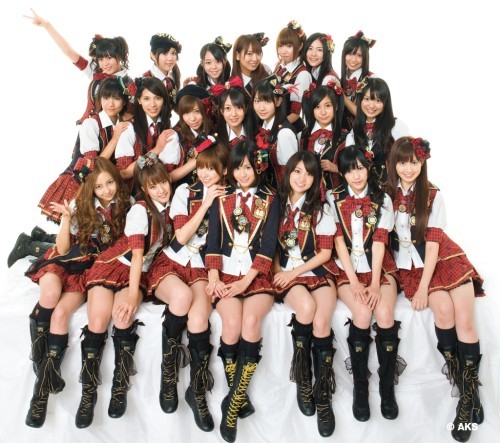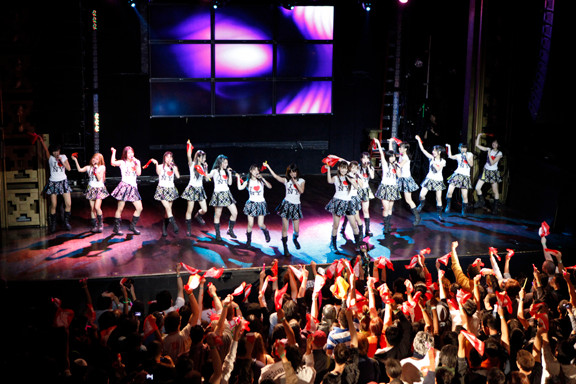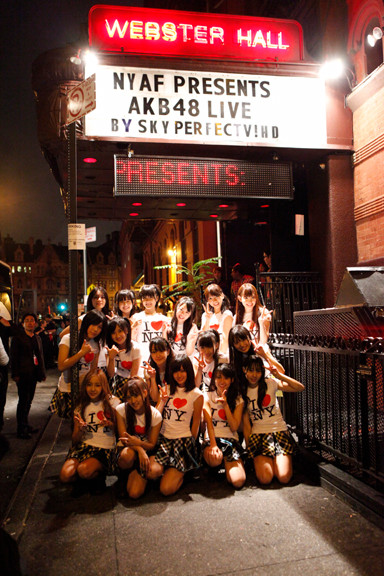17 Minutes in Heaven With AKB48
by Carlo Santos,
The premise of AKB48 can be recited almost by rote: a massively multi-idol girl group based out of Akihabara, divided into three teams (Team A, Team K, Team B) plus trainee ("Research Student") members, putting on daily shows at their theater and interacting with fans in accordance with the motto of "Idols you can meet everyday." However, it's not everyday that one gets to meet these idols on American soil—specifically, at the New York Anime Festival.
They enter the room one by one, wearing the impeccable school uniforms that are AKB48's trademark. Today, four members of the group are here to talk about Japanese pop stardom. Not just any four, either—there is Minami "Takamina" Takahashi (18), soon-to-be captain of Team A and arguably the group's alpha personality; along with Atsuko "Acchan" Maeda (18), the de facto "face of AKB48" based on sheer number of media appearances; then comes Yūko Ōshima (20), Team K's reigning queen of popularity; and finally Haruna "Kojiharu" Kojima (21), a classical beauty who can brighten a magazine photoshoot just by showing up.
Takahashi begins by introducing herself in clipped English. But such formalities are quickly dashed aside when I rattle off their nicknames in rapid fire, causing the girls to squeal with delight. People know who we are? In America?! For them, that's a new experience—but then again, so is everything else, especially for Takahashi, who admits: "This is actually my first time traveling abroad, so I find [New York] to be a really wonderful place."
Maeda and Kojima, on the other hand, were part of the contingent that visited Paris in early July (although they were not among the members that actually performed at Japan Expo). When asked to compare between France and the United States, Maeda folds her arms and thinks it over. "The difference ..." She looks at Kojima, who suggests that "France is kind of old-fashioned, while America is more modern"—at which point Maeda cuts in. "[France is] more artsy, I feel."
As for other places in America that they'd like to visit? Oshima is quick to mention California, which could very well be a hint to convention organizers on the West Coast.

Left to right: Minami Takahashi, Atsuko Maeda, Yūko Ōshima, Haruna Kojima.
The Music
One does not simply walk into AKB48. Like any musical group, auditions are a necessity—along with the personal drive to actually enter said auditions. At the group's public question-and-answer session during the convention, the "front four" are joined by Team K's Sayaka Akimoto (21) and Sae Miyazawa (19), and all of them take turns stating why they wanted to join the group in the first place. Miyazawa's is the perhaps most heartwarming: despite her busy schedule back in junior high, she wanted to enter an audition at least once—and fate took care of the rest.
It is also at the panel that someone asks the girls what their favorite AKB48 songs are. Takahashi picks the group's debut single "Sakura no Hanabiratachi," while Maeda looks to the future with the upcoming single "RIVER"; ask them what their favorite songs are to perform, however, and you get subtly different answers. Takahashi stays with "Sakura" as her favorite to sing, but it's the dance moves of 2008's "Oogoe Diamond" that get her going. Maeda also chooses "Diamond," but it's the English version that's been stuck in her head due to the preparations for the New York trip. Oshima puts down a vote for "RIVER," explaining its appeal: "It has a 'stomp' feel to it ... a cool style that sounds different from our other stuff." And Kojima chooses the birthday song "Namida Surprise" because she "gets to move around a lot."
Then there are the influences, of course. Another audience member at the Q&A asks what the girls like to listen to, and some of the answers are surprising: Akimoto has been hooked on Michael Jackson, while Miyazawa goes for ABBA. Takahashi, ever the honor student, declares 80's idol Akina Nakamori to be her personal preference.
Music snobs everywhere like to dismiss idolhood as a job for the attractive and talentless. But what they lack in talent, they make up for with sheer effort. Takahashi describes the preparation process for a show: "Well, for the daily performances, we arrive about an hour before and start off by doing stretches, and then run through various songs." Meanwhile, playing a major concert venue requires gathering all the members together for a week's worth of rehearsals. And putting together an entirely new stage show requires 2-3 weeks of work.
When asked whether the music or the dance is the greater challenge, Takahashi has no doubts: "It'd have to be the dance that's more difficult to learn." "You have to get everyone in unison," Maeda adds. A daunting task when there may be up to 16 bodies on the stage at once.
Takahashi also points out that things can, and do, go wrong. "Well, this wasn't at an actual performance, but ... —what? Kojima-san?" She spots Kojima and Oshima giggling to each other privately, apparently aware that we are about to get an "embarrassing moment" story. And then she continues: "Right before the actual performance, my skirt got ripped. Ripped in half." Maeda confirms this with a nod.
Hiding embarrassing goofs is easy when there are several other performers on the stage at the same time—but that isn't always the case, as AKB48 also has its share of subgroups. Takahashi and Kojima form two-thirds of No Sleeves, so named for its casual dress code as opposed to the main group's school uniforms. And how do they feel about performing in a small group as opposed to one of the larger Teams? Takahashi urges Kojima to field this one: "Haru-chan! Haru-chan!" she hisses. Kojima gives a look of incredulity. "The difference is ... I dunno. What am I supposed to say?"
Oshima, who has been quietly watching the proceedings, drops her head to the table in mock exasperation.
"The difference is ... it's a little bit lonely up there." Kojima mumbles something else, then looks to Takahashi with a nervous giggle. Team A's alpha member will have to fill in after all. "The difference of performing in a small group is ... like, when we go on a music TV show, all the focus is on us. There's only three of us in No Sleeves, and that means you have to conduct yourself more carefully."
And sometimes it's not just about forming subgroups. Last August, it was announced that the entire AKB48 lineup would undergo a major restructuring in October. Ask the girls how they feel about this, though, and they will give you a perfectly rehearsed diplomatic answer. Attendees at the Q&A panel got to hear six variations on the same theme: "I'm really looking forward to meeting the new members and making new friendships." Somehow, it seems that the fans are taking this harder than the performers are.

The second encore at Webster Hall New York City. (c) AKS.
The Media
The modern-day idol's career is more than just bright, sugary pop songs and energetic dance routines. There are the music videos, the photobooks, the "romping on the beach for 30 minutes" DVDs—but as daughters of the new media, AKB48's real strength lies in how they have capitalized on the Internet. I ask the four girls if they keep personal blogs, and they all nod in unison. (Six years ago, the only way to have gotten that reaction would have been with a lineup of tech aficionados and political wonks.) "Even while in New York, I'm making sure to update the blog regularly," Maeda says of her little corner of the Web.
Takahashi reflects on how this phenomenon has opened a new channel of communication with fans. "Well, being on the Internet, everyone around the world can see it, and when people leave comments, that's something that cheers me up." Still, it only works to a certain extent—if all you fans were secretly hoping that the girls might be visiting your forums, Maeda says, "I don't really get on the Internet that much."
For the less tech-savvy, there are still the traditional ways of getting to know the girls: they appear on a number of TV programs each week, the flagship show being NTV's AKBINGO!. The variety program provides an entirely different venue from the usual song-and-dance environment, which Takahashi explains: "On TV shows, we do a lot of things that idols might not normally do, so people might watch us and think, 'Oh wow, they do this?!' Whereas, when we perform on stage, we're doing all these other things that people might watch and think, 'Oh, they're also very cute and fun.'"
AKBINGO! boasts a variety of games and activities intended to highlight each member's skills and quirks. I ask them which game is their favorite, and this turns out to be the most pressing question of the entire interview. They stare upwards in thought and confer with each other. Maeda looks right. She looks left. Oshima looks back at her. Kojima is zoning out, or something. Finally, after careful consideration: "Shôjiki Shôgi!"
A brief explanation: Shôjiki Shôgi ("honesty chess") is essentially Death Note with idols, a psychological game of cat and mouse that can usually be played in 10 minutes. Two contestants are hooked up to lie detectors, and then challenge each other with potentially embarrassing True/False statements. (Example: "I once farted on stage during a performance.") The first one to set off the lie detector 3 times loses. It is a genuine test of mental toughness, as well as the kind of game that can strain the bonds of friendship—although everyone makes up afterwards, of course.
For viewers, this is incredibly amusing. For the participants, maybe not—when I tell the girls that I find the game "so funny", Oshima retorts in English: "Funny?! Nooo!!" But that's exactly the appeal of Japanese game shows, which are not so much about playing to win, as they are about avoiding various forms of humiliation.

Everyone gathers together after the show. (c) AKS.
The Life
Getting paid to look pretty and dance well may seem like a cushy deal, but it also means giving up one's adolescence and early twenties for essentially a full-time job. Maeda puts it into perspective when she is asked to imagine a world where she didn't get into AKB48: "I'd be just a regular school student ... maybe with a part-time job, wondering what I'm going to do next." At the Q&A panel, an attendee phrases it in a more positive way, asking what experiences are unique to being an idol as opposed to leading a normal life. For most of them, it's the opportunity to go to New York, but Kojima has a wittier answer: "I used to always eat convenience store lunches, but as a member [of the group], I can eat really nice food."
The panel audience also wants to know about each member's activities in their free time. Miyazawa picks the ever-popular "eating, sleeping, and more eating," while Oshima goes with "just sleeping." Maeda's choice is the movie theater, Kojima likes to go shopping, but it's probably Takahashi who wins over the NYAF audience when she says "reading manga, playing video games ... and sleeping."
Eventually the interview arrives at this question: "What do you think is the most important skill in being a successful idol?" Somehow everyone ends up deferring to Kojima, who says "That's something I try not to think about too much."
A moment of Zen?
Fortunately, a similar question at the Q&A panel puts it in more concrete terms when a young girl asks for advice in kick-starting her showbiz career. "Don't give up, and follow your dreams," Takahashi says with a fist pump. A few of the other members also emphasize the importance of being cute. Oshima has a warning, though: "I wish you success, but please don't surpass AKB48. You're gonna be our rival."
It is the last question at the panel, however, that maybe says all that needs to be said about the idiosyncratic ways of the idol culture.
"Do any of you guys have boyfriends?"
The audience breaks out in laughter. All the members make strange faces. Maeda crosses her arms in the familiar "X" gesture. Looks like a unanimous "no."
On the other hand, the interview ends more cordially, with the girls giving out copies of the group's latest single and each of the three teams' most recent studio albums. The CDs are a gift of goodwill, a sign that they truly want to be appreciated. They are just as thrilled to be here as their fans are to have them here. In a few days, they will be flying back to Japan—but something tells me this won't be the last time we see them in America.
discuss this in the forum (17 posts) |